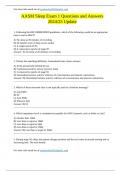Hypoventilation emergence - Study guides, Class notes & Summaries
Looking for the best study guides, study notes and summaries about Hypoventilation emergence? On this page you'll find 46 study documents about Hypoventilation emergence.
All 46 results
Sort by
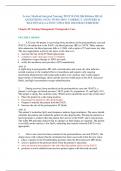
-
Lewis: Medical-Surgical Nursing TEST BANK 8th Edition. REAL QUESTIONS (NGN) WITH 100% CORRECT ANSWERS & RATIONALE.LATEST UPDATED 2023/2024(VERIFIED)
- Exam (elaborations) • 383 pages • 2023
-
- $20.49
- 2x sold
- + learn more
Chapter 20: Nursing Management: Postoperative Care MULTIPLE CHOICE 1. A 42-year-old patient is recovering from anesthesia in the postanesthesia care unit (PACU). On admission to the PACU, the blood pressure (BP) is 124/70. Thirty minutes after admission, the blood pressure falls to 112/60, with a pulse of 72 and warm, dry skin. The most appropriate action by the nurse at this time is to a. increase the rate of the IV fluid replacement. b. continue to take vital signs every 15 minutes....

-
Anesthesia and moderate sedation latest update graded A+
- Exam (elaborations) • 13 pages • 2024
- Available in package deal
-
- $9.99
- + learn more
Anesthesia and moderate sedation latest update graded A+ general anesthesia causes loss of sensation, consciousness and reflexes. for major surgery or one that requires major relaxation general anesthesia risk factors Family history of malignant hyperthermia Respiratory disease (hypoventilation) Cardiac disease (dysrhythmias, altered cardiac output) Gastric contents (aspiration) Alcohol or drug abuse local anesthesia loss of sensation w/o loss of sensation Local anesthesia ri...
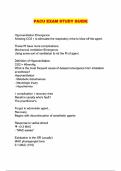
-
PACU EXAM STUDY GUIDE
- Exam (elaborations) • 17 pages • 2024
- Available in package deal
-
- $12.49
- + learn more
PACU EXAM STUDY GUIDE...
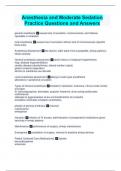
-
Anesthesia and Moderate Sedation Practice Questions and Answers
- Exam (elaborations) • 7 pages • 2024
- Available in package deal
-
- $9.49
- + learn more
general anesthesia causes loss of sensation, consciousness, and reflexes injectable or inhalation local anesthesia causes loss of sensation without loss of consciousness (specific body area) Anesthesia Assessment risk factors: older adult more susceptible, airway patency, titrate carefully General anesthesia assessment family history of malignant hyperthermia resp. disease (hypoventilation) cardiac disease (dysrhythmias, altered cardiac output) gastric contents (aspiration) alcohol...
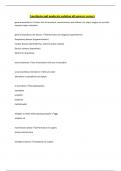
-
Anesthesia and moderate sedation all answers correct
- Exam (elaborations) • 8 pages • 2024
- Available in package deal
-
- $9.99
- + learn more
Anesthesia and moderate sedation all answers correct general anesthesia causes loss of sensation, consciousness and reflexes. for major surgery or one that requires major relaxation general anesthesia risk factors Family history of malignant hyperthermia Respiratory disease (hypoventilation) Cardiac disease (dysrhythmias, altered cardiac output) Gastric contents (aspiration) Alcohol or drug abuse local anesthesia loss of sensation w/o loss of sensation Local anesthesia risk fac...
AASM Sleep Exam 1 Questions and Answers 2024/25 Update Test 1 / 400 AASM Sleep Tech Practice Questions Print test Options ...
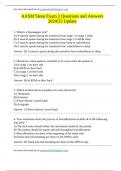
-
AASM Sleep Exam 2 Questions and Answers 2024/25 Update
- Exam (elaborations) • 43 pages • 2024
-
- $22.99
- + learn more
AASM Sleep Exam 2 Questions and Answers 2024/25 Update Following RECOMMENDED guidelines, which of the following would be an appropriate time to end an MWT: 1. No sleep at 20 minutes of recording 2. 20 minutes even if sleep occurs earlier 3. A single epoch of N1 4. 3 consecutive epochs of stage N1 Choose matching definition Generalized tonic-clonic seizures In the preauricular behind the ear Continuous positive airway pressure mask 3 consecutive epochs of stage N1 Don't know? 1 o...
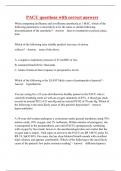
-
PACU questions with correct answers
- Exam (elaborations) • 7 pages • 2023
- Available in package deal
-
- $13.99
- + learn more
When comparing desflurane and sevoflurane anesthesia at 1 MAC, which of the following parameters is most likely to be the same or similar following discontinuation of the anesthetic? - Answer time to orientation to person, place, time Which of the following tests reliably predicts recovery of airway reflexes? - Answer none of the above A. a negative inspiratory pressure of 25 cmH2O or less B. sustained head lift for 10seconds C. return of train-of-four response to preoperative le...
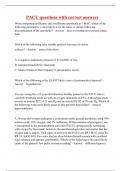
-
PACU questions with correct answers
- Exam (elaborations) • 7 pages • 2023
- Available in package deal
-
- $13.49
- + learn more
When comparing desflurane and sevoflurane anesthesia at 1 MAC, which of the following parameters is most likely to be the same or similar following discontinuation of the anesthetic? - Answer time to orientation to person, place, time Which of the following tests reliably predicts recovery of airway reflexes? - Answer none of the above A. a negative inspiratory pressure of 25 cmH2O or less B. sustained head lift for 10seconds C. return of train-of-four response to preoperative le...
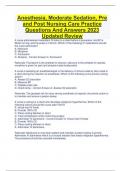
-
Anesthesia, Moderate Sedation, Pre and Post Nursing Care Practice Questions And Answers 2023 Updated Review
- Exam (elaborations) • 20 pages • 2023
- Available in package deal
-
- $12.99
- + learn more
Anesthesia, Moderate Sedation, Pre and Post Nursing Care Practice Questions And Answers 2023 Updated Review A nurse administered midazolam IV bolus to a client before a procedure. His BP is 86/40 mm Hg, and his pulse is 134/min. Which of the following IV medications should the nurse administer? A. Naloxone B. Morphine C. Flumazenil D. Atropine - Correct Answer-C. Flumazenil Rationale: Flumazenil is the antidote for benzos, naloxone is the antidote for opioids, morphine is given...

Study stress? For sellers on Stuvia, these are actually golden times. KA-CHING! Earn from your study resources too and start uploading now. Discover all about earning on Stuvia



